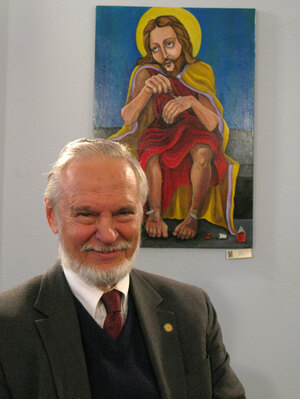On Nov. 2, 2009, the New York Times published an article called Creationism, Minus a Young Earth, Emerges in the Islamic World.
Apparently, the problem is not evolution, it's human evolution.
For many Muslims, even evolution and the notion that life flourished without the intervening hand of Allah is largely compatible with their religion. What many find unacceptable is human evolution, the idea that humans evolved from primitive primates. The Koran states that Allah created Adam, the first man, separately out of clay.
Pervez A. Hoodbhoy, a prominent atomic physicist at Quaid-e-Azam University in Pakistan, said that when he gave lectures covering the sweep of cosmological history from the Big Bang to the evolution of life on Earth, the audience listened without objection to most of it. “Everything is O.K. until the apes stand up,” Dr. Hoodbhoy said.
What jumped out at me is the notion that "a negative reaction to evolutionary theory could reflect a struggle to retain cultural traditions and values against Western influences," according to Salman Hameed, who convened the two-day conference here at Hampshire College.
That makes sense to me.
The article
 by Kenneth Chang goes on to say that "in the West, where non-Islamic influences are strongest, Islamic creationism may be stronger in reaction to the outside pressure." For example, "high school students at Islamic schools in and near Toronto were far more doubting of evolution than students in Indonesia or Pakistan."
by Kenneth Chang goes on to say that "in the West, where non-Islamic influences are strongest, Islamic creationism may be stronger in reaction to the outside pressure." For example, "high school students at Islamic schools in and near Toronto were far more doubting of evolution than students in Indonesia or Pakistan."In other words, the more a minority feels under threat by the majority culture of the Western society, the more it clings to its own culture. The more the minority feels beleaguered, the more it clings to its beliefs. And the more the minority clings to its beliefs (especially beliefs that are wrong), the more potential for conflict with the majority culture.
Ergo, the more tolerant the majority culture is toward minorities, the less minorities feel the need to cling to their own beliefs, etc., etc. And the less the majority culture has to fear from its minorities.
Chew on that, Lou Dobbs.
(Photo by David Jonathan Ross. Photo credit: Darwin's finches on the Islamic symbol in art work used at a conference in Massachusetts about the acceptance of evolution among Muslims.)
